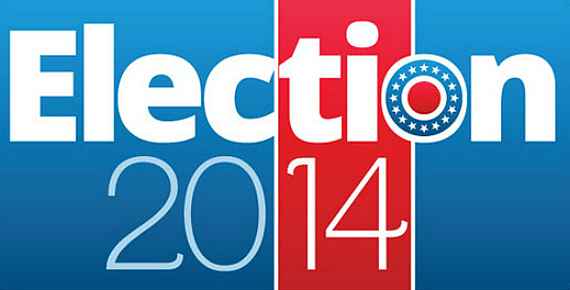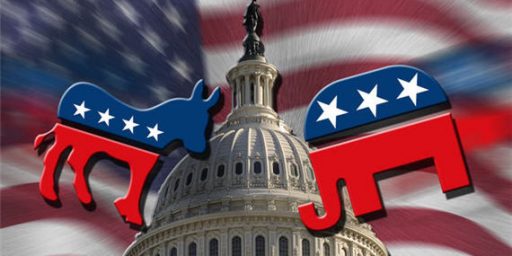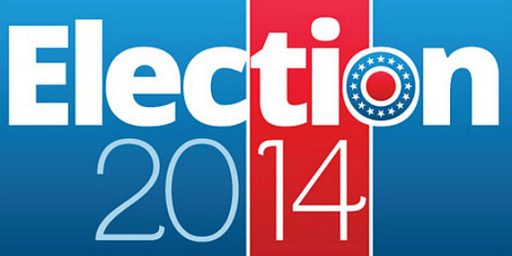A Surprise Brewing In South Dakota’s Senate Race?
Is former Senator Larry Pressler surging in his Independent bid to win back his old Senate seat?
For months now, the Senate race in South Dakota, which is open due to the fact that Senator Tim Johnson is retiring, has been seen as an easy Republican pickup. Former Governor Mike Rounds easily won the GOP nomination for the seat has been, and continues to be the frontrunner in the race. One potential curve ball in the race has been the Independent candidacy of former Senator Larry Pressler, who represented the state from 1979 through 1997 as both a Congressman (back in the day when South Dakoka still had two Congressional Districts) and later as Senator, who entered the race late last year in what many viewed at the time as a quixotic bid for a comeback. As it turns out, Pressler has polled stronger than many had expected, no doubt in some part due to name recognition, but a new poll is raising questions about whether he could pose a threat to Rounds in November:
Independent Larry Pressler continues to steal support from Republican Mike Rounds in the race for U.S. Senate, while Democrat Rick Weiland falls behind, a new poll shows.
Survey South Dakota — conducted by Survey USA on behalf of the American News, KSFY TV of Sioux Falls and KOTA TV of Rapid City — was of 616 likely voters and was conducted between Oct. 1 and Sunday. It shows 35 percent of those responding will vote for Rounds, 32 percent for Pressler and 28 percent for Democrat Rick Weiland. Three percent of voters back independent Gordon Howie and 2 percent are undecided, according to the poll. It has a margin of error of 4 percent.
A Survey USA poll released a month ago showed Rounds with 39 percent support, Weiland with 28 percent and Pressler with 25 percent.
Were Weiland to drop out of the race, 71 percent of his voters say they would back Pressler compared to only 9 percent for Rounds. That would give Pressler 54 percent of the vote compared to 39 percent for Rounds. As things stand, though, Rounds could be elected with less then 40 percent of the vote, the poll shows.
Should Pressler drop out, the race would be a dead heat between Rounds and Weiland, with each major party candidate picking up 47 percent of the vote, according to poll results.
With all three men on the ballot, Rounds is backed by only 55 percent of Republican Party base, according to the survey.
(…)
Among voters 50 to 64 years old, Pressler is the most popular candidate in the Senate race. Among those surveyed who are older than 65, Rounds is the top choice, according to the poll. It also shows that the economy is the most important issue in South Dakota congressional races, with health care a distant second. The economy is the most important issue to Republicans, Democrats and independents, according to the survey.
There hasn’t been a whole lot of polling in South Dakota this year, but what there has been has shown Rounds in the lead in what has turned into a three-way race thanks to Pressler’s stronger than initially expected showing in the polls. Polling conducted prior to the release of this poll showed Rounds up by 15 points and 13 points respectively, and even with this new poll added in Rounds maintains an 11.7 point lead in the RealClearPolitics average. As with the poll we saw earlier this week from Kentucky, though, this new poll raises the question of whether we’re looking at an outlier, or the indication that the race is changing in the final month thanks largely to a rise in support for Pressler, who had been a fixture in South Dakota politics until being defeated in 1996 by the Senator who he now seeks to succeed. Up until now, Pressler has seemingly played the role of spoiler by preventing either candidate from getting anywhere close to 50% of the vote in a poll, but the question now is whether he’s likely to become a real contender.
As with the poll that purports to show Alison Lundergan Grimes leading in Kentucky, it is best to take this single result with a grain of salt. As with Kentucky, all of the polling to date has shown Rounds, and indeed with a very strong lead, so a single poll that shows something different should be viewed suspiciously until there are others polls out there that seem to corroborate it. Additionally, it’s worth noting that, like Kentucky, this is a SurveyUSA poll and it was released on the same day as a SurveyUSA poll of the Kansas Senate race that showed Greg Orman with a smaller lead over Pat Roberts than any of the other recent polling. While its possible that SurveyUSA is picking up something that other pollsters are not, it’s also possible that these three polls are indicative of something quirky in their methodology that is causing them to come up with results that are outside of the mainstream. Again, we’ll have to wait to see what other pollsters have to say.
Nate Silver comments on the new poll and what it might mean for the race:
This is a challenging race to forecast — both because of the inconsistent polling and the three-way dynamic. But the logic programmed into the FiveThirtyEight model is as follows: because Pressler is more ideologically similar to Rounds than Weiland — at least according to the statistical measures that we use — the model assumes that Pressler and Rounds will mostly trade votes with one another rather than with Weiland. In other words, Pressler’s gains will tend to come at Rounds’ expense, and vice versa. (See here for a more technical explanation.)
That makes Pressler the more likely candidate to pull off the upset; he can gain ground relative to the frontrunner more quickly. The FiveThirtyEight model currently gives Pressler a 9 percent chance of winning the race, versus 3 percent for Weiland. Those chances will grow if more polls come along with results like SurveyUSA’s.
Yet another complication is that Pressler has refused to say who he’ll caucus with. Our ideology ratings imply that he’s equivalent to a moderate Republican — just as they imply that Orman is equivalent to a moderate Democrat. So the model assumes there’s a 75 percent chance Pressler would caucus with Republicans if he wins, just as it assumes there’s a 75 percent chance Orman would caucus with Democrats. But Pressler endorsed Barack Obama in both 2008 and 2012 and has at times implied that he’d refuse to caucus with anybody.
Rounds remains the favorite. It’s not clear that Pressler has enough money to run a substantial number of advertisements in the closing days of the campaign — or to finance a voter turnout operation. And for the time being, the SurveyUSA poll is mostly alone.
But the race increases the chance that we’ll have a “messy” outcome on Election Day.
So, stay tuned on this one, but suffice it to say that if the GOP has to start worrying about South Dakota this late in the game its going to play havoc with their game plan for the last month of the race.





Orman and Pressler are exactly why, despite Superdestroyers fevered warnings, the US will never be dominated by a single party for long. Both parties are coalitions, even in the bluest/reddest, most homogenous states. If a party ignores a prominent part of its coalition, in this case, moderate Republicans, the slice of the electorate it alienates will find a way to regain power, via allying itself with elements of the other party.
” Democrat Heidi Heitkamp”
She’s from North Dakota. South Dakota’s other senator is John Thune.
@Moosebreath:
Yes, I blame it on the caffeine not working yet this morning. I’ve deleted that portion of the post.
For a slam dunk midterm election, Republicans sure are having an awful lot of trouble getting their Senate majority. While I suspect they will still succeed, I do wonder what they think all these travails bode for them come 2016.
@OzarkHillbilly:
I don’t know that they’re having all that much trouble at all. You seem to want to latch on to this batch of polls from SUSA as if they mean something. We don’t know that they do.
@Doug Mataconis:
Well…only to the extent that 1 or 2 seats is not the same as 5 or 6.
Functionally the number doesn’t matter…a majority is still a majority.
Until it’s a super-majority.
They’ll still claim it’s a mandate to do whatever radical thing it is they want to do.
@Doug Mataconis: Doug, did you actually read what I wrote?
@humanoid.panda:
If you add up everyone who is not an automatic Democratic Party voter, it still is less than 50% of the voters nationwide. Thus, all of those “moderate Republicans” who want to remain in politics have to find a new way to survive. The first step is to run as an independent but caucus with the Democrats. The next step is just to become Democrats. All moderates will eventually drift to the left politically as they fall in love with bigger government, having power, and pet-peeve social engineering programs.
Even NPR is beginning to notice in Georgia that demographics is more important than anything else http://www.npr.org/2014/10/03/353534726/as-populations-shift-democrats-hope-to-paint-the-sun-belt-blue
@Doug Mataconis: ” You seem to want to latch on to this batch of polls from SUSA as if they mean something. We don’t know that they do.”
Dude, you’re the one writing about them.
@superdestroyer: Yes, definitely, the only reason why someone like Orman is allying himself to the Democrats is because Kansas is chock-full of “automatic democratic party voters.”
Additionally, I don’t know if you noticed, but the dynamic you describe already happened before: the Democrats became ascendant in the 1930s, on a coalition of Southern Whites, and Nothern ethnics and union members, automatic Democratic voters all, and passed a raft of Big Government programs the electorate fell in love with. Did this mean a single party state? No, it meant that the Right recalibrated itself, redefined Catholics and ethnics as part of the club, accepted Social Security as fact, and moved on to winning many many elections. Now, from the point of view of, say, Robert Taft, this means the ascendance of a one party state, as both major parties will never go after the foundations of the welfare state. However ,from the point of view of someone living in 21st century, it is bullocks..
If Weiland drops out and Pressler surges, the cat may truly be among the pigeons. The Republican chances of gaining a majority may move up “likely” to “tossup.” There’s a lot of race to run.
conducted by Survey USA on behalf of the American News, KSFY TV of Sioux Falls and KOTA TV of Rapid City — was of 616 likely voters
Holy crap! They interviewed everyone in the entire state.
There’s another dynamic at work in the this senate race. The principle advisors to Rounds and Weiland are Dick Wadhams and Steve Jarding. They were advisors to Allen and Webb in the Virginia 2005 Senate race. This in some ways is a rematch for these two. Both of these advisors are some of the best.
Pressler has benefited from the issues Weiland has raised concerning Rounds involvement or lack of involvement in an EB5 scandal while Governor. It is safe to say that Rounds has lost voters to Pressler. Weiland voters are mostly base democratic voters it appears.
Both the Rounds and Weiland campaigns have more or less ignored Pressler up to this point. The Rounds campaign has no choice now but to go negative on Pressler to get those voters back. Will it work? Or will some defect to Weiland? It must look promising for Weiland as two PACs recently committed a million each to this senate race.
What happens in the next couple of weeks will be very interesting.
First if Pressler wins, he will likely caucus with GOP especially if he wants to increase his chance of reelection. 2nd he has been overlooked so far. Now he will get the negative attacks just like Orman has recently been attacked in Kansas. Two very recent polls showed major shift toward Roberts and I suspect that will continue. Same will probably happen in SD as well.
One more thing, Orman has been running Hope and Change type of campaign. He has great hopes but won’t answer where he stands on many issues. If Roberts or one of those third party activist groups would go after Orman and tie him into another unqualified “hope and change” candidate, then Orman is sunk.